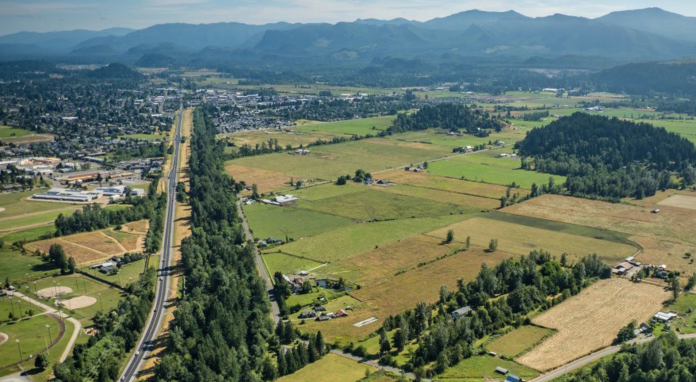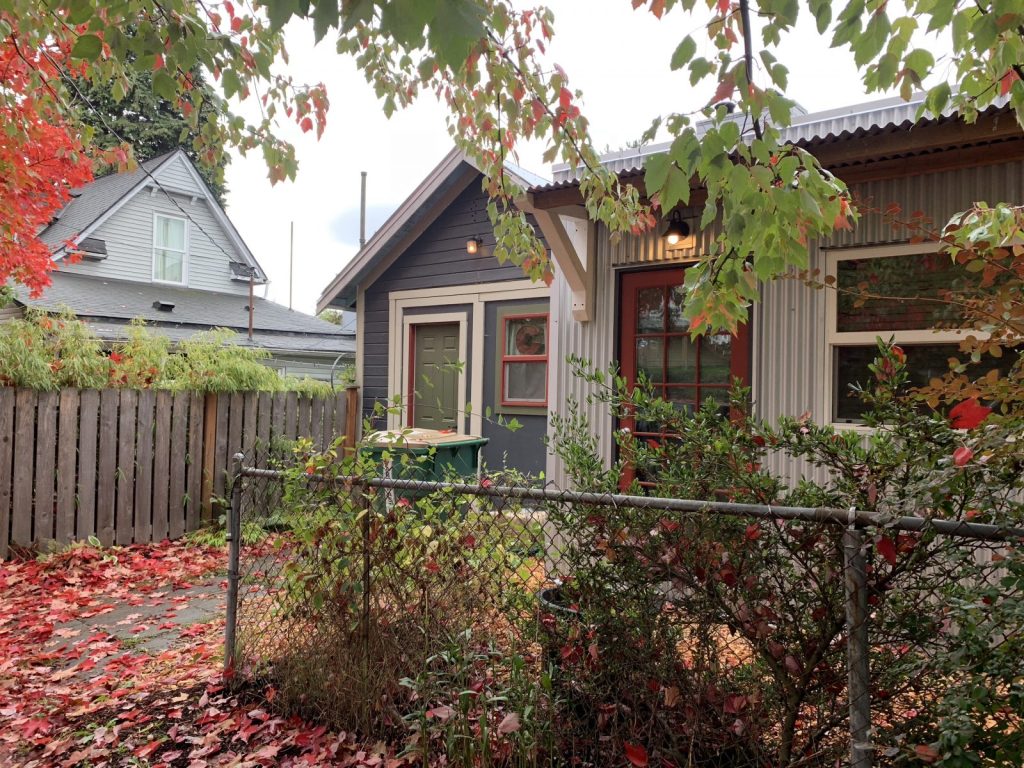[ad_1]

Whether permitting new indifferent dwelling models on most heaps within the state’s rural areas would undermine many years of progress planning is a query that’s been put front-and-center by House Bill 2126.
Whether to permit property homeowners in Washington’s rural areas to construct indifferent accent dwelling models (DADUs) separate from a major home is popping into a reasonably contentious concern throughout this 12 months’s legislative session. To many policymakers grappling with Washington’s housing affordability disaster, the change is a wise one that may permit flexibility and result in elevated housing choices within the state’s rural areas however on the opposite aspect are conservation and environmental advocates involved that probably doubling the variety of models allowed on rural heaps will result in elevated sprawl and out-of-control water utilization.
Unlike connected ADUs, that are constructed as an addition to a major dwelling construction, with a separate entrance however with shared utilities, DADUs are wholly separate buildings. Last 12 months, the legislature handed a sweeping overhaul of ADU coverage, permitting each ADUs and DADUs on most heaps within the state’s city areas, however the query of what must be allowed close to farmlands in rural areas is a one other query with broad implications on Washington’s general housing progress technique.
House Bill 2126, launched by Representative Sam Low (R-39, Lake Stevens), who additionally serves as a Snohomish County Councilmember, would permit property homeowners in rural areas to assemble a indifferent accent dwelling unit on any sized lot, so long as no crucial areas are encroached upon and the allow applicant can exhibit that the prevailing sewage or septic system can deal with the elevated demand, and the brand new DADU should use the identical driveway as the first dwelling.
The invoice is a direct response to a ruling from the state’s Growth Management Hearings Board (GMHB), the entity tasked with resolving disputes over the 1990 Growth Management Act (GMA). In 2022, Snohomish County handed an ordinance considerably increasing the variety of heaps the place property homeowners might construct DADUs outdoors the city progress boundary. An attraction was filed, and in 2023 the GMHB dominated towards Snohomish County, discovering that the ordinance “fail[ed] to guard designated agricultural lands of long-term industrial significance,” and that it was inconsistent with its personal countywide planning insurance policies. The county was pressured to reverse its ordinance, placing again in place restrictions on DADUs on heaps that don’t meet the usual lot measurement, however HB 2126 would permit Snohomish County to reinstate that coverage, and another county that so chooses. It wouldn’t robotically take impact.
“This robust, bipartisan, affordable invoice is a really complicated try at threading the attention of the needle in terms of indifferent ADUs,” Rep. Low mentioned on the first public listening to on his invoice in mid January. “Most of this invoice just isn’t unique with me…It picks up on earlier discussions and former negotiations and actually makes an attempt to seek out widespread floor within the center to get a robust bipartisan, reasonably priced rural housing DADU [bill] throughout the end line.”
So far, the invoice hasn’t gotten a lot pushback from throughout the legislature itself, with its first vote out of the House’s housing committee utterly unanimous. In the approaching days, the invoice is predicted to be pulled to the ground for a full vote of the House.

But advocates for land conservation in lots of corners of the state got here out to oppose the invoice. “Generally talking, the approval of ADUs in rural areas will solely serve to additional legitimize unlawful city sprawl into rural areas, which is in violation of the very essence of the GMA,” mentioned Phyllis Kardos, the co-chair of Responsible Growth Northeast Washington, which is targeted on Pend Oreille County. “This is a case the place what might look good on paper has a detrimental environmental cumulative impression on the bottom. Whether it’s a giant piece of rural land or a small rural lot, fragmentation of those areas to accommodate extra homes and folks will lead to extra forest land, agricultural land, open area destruction and loss.” The legislature additionally heard from advocates in locations just like the San Juan islands and Whidbey island, the place rural land is much more scarce.
One of the extra worrying elements of the invoice, sprawl opponents say, is a provision that may not depend the DADUs that may be permitted underneath the invoice as contributing to the world’s official progress targets, basically permitting extra models constructed as DADUs to come back in on high of different models being inbuilt rural areas. King County presently does permit DADUs like those that may be permitted underneath HB 2126, however consists of them in its rural progress targets. HB 2126 would basically double the variety of models allowed in rural areas of King County underneath the GMA, even because the county is making an attempt to focus progress in city areas.
Futurewise, the statewide nonprofit that always finds itself the only steward of the Growth Management Act in terms of authorized appeals, was the group that took Snohomish County to the Growth Management Hearings Board over its DADU invoice. They’re urging lawmakers to reject the invoice, and spend extra time engaged on a coverage that makes extra sense for rural areas.
“Obviously Futurewise has been supporting city accent dwelling models of every type for fairly some time now,” Alex Brennan, Futurewise’s govt director, informed The Urbanist. “But once we get into the agricultural context, the precise actuality of what’s getting constructed seems to be actually totally different.” He cited elevated prices to offer emergency providers in rural areas, will increase within the quantity of impervious surfaces that include DADUs, and, on the high of the listing, elevated water utilization as major causes that Futurewise doesn’t wish to see the invoice transfer ahead.
“Studies which have been accomplished rural connected accent dwelling models in comparison with rural indifferent accent dwelling models, [showing] that the indifferent models use much more water and that may be form of counterintuitive, however that’s actually about outside water use,” Brennan mentioned. “And you find yourself simply seeing much more water use and that’s notably regarding, additionally, as a result of we don’t have good methods of regulating water use simply usually for small residential improvement in rural areas.”
A definite however comparable counterpart invoice within the state senate, SB 6029, can also be on the receiving finish of criticism from conservation and sensible progress advocates, however would in the end be much less permissive than HB 2126, solely permitting DADUs on conforming heaps.
Representative Julia Reed, who represents the thirty sixth legislative district which incorporates a few of the most city areas of the state together with Queen Anne and Ballard however no rural areas, signed on as a co-sponsor of HB 2126. “I’m not 100% offered by hook or by crook, however I signed on, as a result of, I feel this can be a dialog really, actually value having. And I feel we’re gonna have to speak much more about, what does rural housing appear to be at the moment? Because it’s very totally different from what it appeared like, even 20 years in the past.”
“I used to be very moved by testimony in committee that we heard on this invoice, particularly round the concept no matter what’s taking place with state rules, these ADUs are stepping into, persons are constructing them as sheds or as one thing else,” Reed informed The Urbanist. She additionally introduced up property homeowners who aren’t capable of construct a indifferent ADU in order that they buy adjoining or close by properties as a substitute. “So whilst you know the Growth Management Act is meant to guard and protect the farmland that we’ve got, as a result of folks really feel that it’s not responding to the fact of what’s happening of their communities, we’re shedding extra farmland by being very hardline on this piece across the Growth Management Act.”
Brennan described the concept restrictions on new models must be loosened as a result of folks aren’t presently complying with them as irritating. “From our perspective, if the issue is enforcement, then we should always give you an enforcement technique,” he mentioned. “The Growth Management Act is being blamed for inflicting issues in rural elements of the state which might be actually not concerning the Growth Management Act, from our perspective…I feel we wish to have an actual dialogue with of us who’re coming from these communities involved about these points and seeing this as a possible resolution.”
Ryan Packer lives within the Summit Slope neighborhood of Capitol Hill and has been writing for the The Urbanist since 2015. They report on multimodal transportation points, #VisionZero, preservation, and native politics. They consider in utilizing Seattle’s historical past to assist attain the colourful, various metropolis that all of us want to inhabit. Ryan’s writing has appeared in Capitol Hill Seattle Blog, Bike Portland, and Seattle Bike Blog, the place additionally they did a four-month stint as non permanent editor.
[ad_2]





